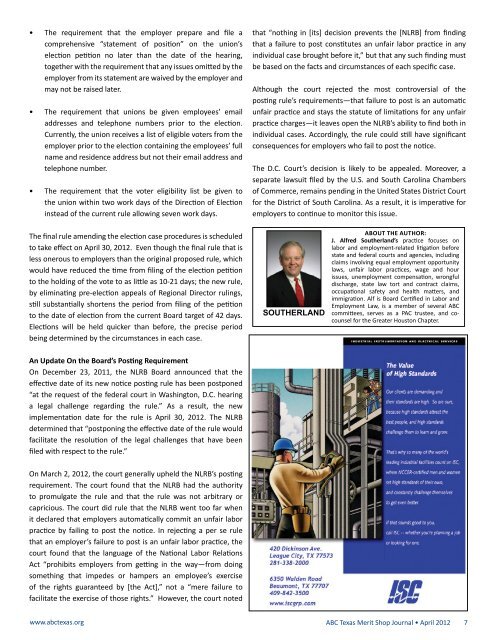ABC Texas Merit Shop Journal • April 2012 1 www ... - ABC of Texas
ABC Texas Merit Shop Journal • April 2012 1 www ... - ABC of Texas
ABC Texas Merit Shop Journal • April 2012 1 www ... - ABC of Texas
- TAGS
- merit
- april
- abctexas.org
You also want an ePaper? Increase the reach of your titles
YUMPU automatically turns print PDFs into web optimized ePapers that Google loves.
<strong>•</strong> The requirement that the employer prepare and file a<br />
comprehensive “statement <strong>of</strong> position” on the union’s<br />
election petition no later than the date <strong>of</strong> the hearing,<br />
together with the requirement that any issues omitted by the<br />
employer from its statement are waived by the employer and<br />
may not be raised later.<br />
<strong>•</strong> The requirement that unions be given employees’ email<br />
addresses and telephone numbers prior to the election.<br />
Currently, the union receives a list <strong>of</strong> eligible voters from the<br />
employer prior to the election containing the employees’ full<br />
name and residence address but not their email address and<br />
telephone number.<br />
<strong>•</strong> The requirement that the voter eligibility list be given to<br />
the union within two work days <strong>of</strong> the direction <strong>of</strong> election<br />
instead <strong>of</strong> the current rule allowing seven work days.<br />
The final rule amending the election case procedures is scheduled<br />
to take effect on <strong>April</strong> 30, <strong>2012</strong>. even though the final rule that is<br />
less onerous to employers than the original proposed rule, which<br />
would have reduced the time from filing <strong>of</strong> the election petition<br />
to the holding <strong>of</strong> the vote to as little as 10-21 days; the new rule,<br />
by eliminating pre-election appeals <strong>of</strong> regional director rulings,<br />
still substantially shortens the period from filing <strong>of</strong> the petition<br />
to the date <strong>of</strong> election from the current Board target <strong>of</strong> 42 days.<br />
elections will be held quicker than before, the precise period<br />
being determined by the circumstances in each case.<br />
An Update on the Board’s Posting requirement<br />
on december 23, 2011, the nLrB Board announced that the<br />
effective date <strong>of</strong> its new notice posting rule has been postponed<br />
“at the request <strong>of</strong> the federal court in Washington, d.C. hearing<br />
a legal challenge regarding the rule.” As a result, the new<br />
implementation date for the rule is <strong>April</strong> 30, <strong>2012</strong>. The nLrB<br />
determined that “postponing the effective date <strong>of</strong> the rule would<br />
facilitate the resolution <strong>of</strong> the legal challenges that have been<br />
filed with respect to the rule.”<br />
on March 2, <strong>2012</strong>, the court generally upheld the nLrB’s posting<br />
requirement. The court found that the nLrB had the authority<br />
to promulgate the rule and that the rule was not arbitrary or<br />
capricious. The court did rule that the nLrB went too far when<br />
it declared that employers automatically commit an unfair labor<br />
practice by failing to post the notice. In rejecting a per se rule<br />
that an employer’s failure to post is an unfair labor practice, the<br />
court found that the language <strong>of</strong> the national Labor relations<br />
Act “prohibits employers from getting in the way—from doing<br />
something that impedes or hampers an employee’s exercise<br />
<strong>of</strong> the rights guaranteed by [the Act],” not a “mere failure to<br />
facilitate the exercise <strong>of</strong> those rights.” However, the court noted<br />
<strong>www</strong>.abctexas.org<br />
that “nothing in [its] decision prevents the [nLrB] from finding<br />
that a failure to post constitutes an unfair labor practice in any<br />
individual case brought before it,” but that any such finding must<br />
be based on the facts and circumstances <strong>of</strong> each specific case.<br />
Although the court rejected the most controversial <strong>of</strong> the<br />
posting rule’s requirements—that failure to post is an automatic<br />
unfair practice and stays the statute <strong>of</strong> limitations for any unfair<br />
practice charges—it leaves open the nLrB’s ability to find both in<br />
individual cases. Accordingly, the rule could still have significant<br />
consequences for employers who fail to post the notice.<br />
The d.C. Court’s decision is likely to be appealed. Moreover, a<br />
separate lawsuit filed by the U.S. and South Carolina Chambers<br />
<strong>of</strong> Commerce, remains pending in the United States district Court<br />
for the district <strong>of</strong> South Carolina. As a result, it is imperative for<br />
employers to continue to monitor this issue.<br />
SOUTHERLANd<br />
ABoUT THe AUTHor:<br />
J. Alfred southerland’s practice focuses on<br />
labor and employment-related litigation before<br />
state and federal courts and agencies, including<br />
claims involving equal employment opportunity<br />
laws, unfair labor practices, wage and hour<br />
issues, unemployment compensation, wrongful<br />
discharge, state law tort and contract claims,<br />
occupational safety and health matters, and<br />
immigration. Alf is Board Certified in Labor and<br />
employment Law, is a member <strong>of</strong> several <strong>ABC</strong><br />
committees, serves as a PAC trustee, and cocounsel<br />
for the Greater Houston Chapter.<br />
<strong>ABC</strong> <strong>Texas</strong> <strong>Merit</strong> <strong>Shop</strong> <strong>Journal</strong> <strong>•</strong> <strong>April</strong> <strong>2012</strong> 7


